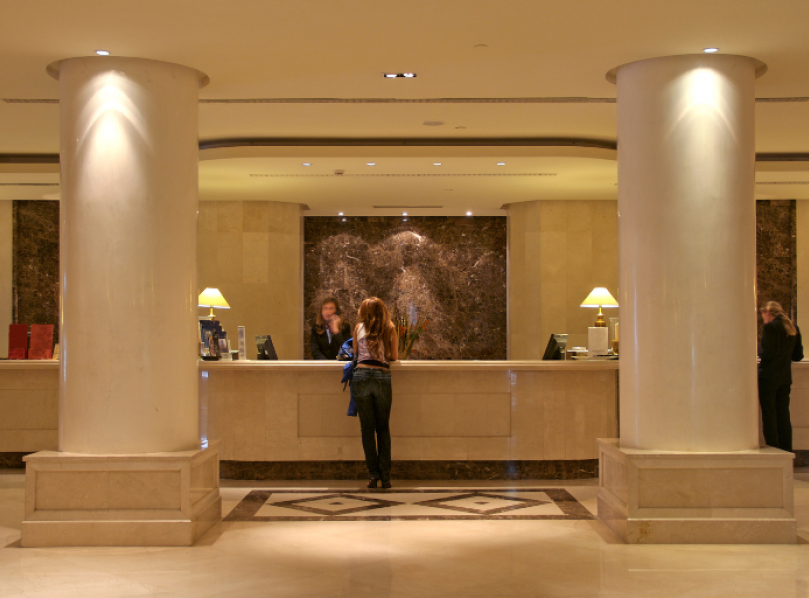- About
- Programs
- Campus life
- Career Services
- Admissions
- News & Events
- Alumni
Hollow luxury hospitality
Hollow luxury hospitality
A look at the evolving definition of luxury, the condition of luxury hospitality in today's world post- Covid-19 pandemic, and what an education in hospitality and hotel management is doing for the hospitality industry.
In modern times, luxury goods and luxury hotel services are already difficult to define. What do we associate with the word luxury when we hear it? Quality? Exclusivity? Consumers are more and more aware of an increase of marketing for goods and services that look and sound better than they actually are. In hospitality, there is a façade of luxury hidden behind extras such as modern décor, hot tubs, or niche locations. Yet, more often than not, there is something basic missing. The hotel lobby is beautiful, but it takes an hour to find someone to grudgingly check you in. Though there is a beautiful pool, your room’s shower has no hot water. There is an open bar at the restaurant, but the bartender only knows two cocktails.
That is what we call hollow luxury hospitality. Hollow, like an empty shell: beautiful on the outside, but no life on the inside.
We talk a lot about what luxury goods are, but not enough about what luxury services entail. Establishments proclaim on social media and their own websites that they offer impeccable, personalized, and luxurious hotel service, but perhaps due to lack of experience, they do not understand what it means, the specifics of what they are offering. The varying range of the actual quality of services and amenities only contributes to diluting the meaning of luxury in the first place. Either these companies are selling dreams by offering exclusive services but lack the know-how to provide them (case in point, the failure of the infamous Fyre Festival) or these companies have not trained their staff to the requirements of a clientele frequenting luxury establishments.
The problem is two-fold: first, we need to define what constitutes a luxury hotel. Granted, the definition of what “luxury” means is debatable, and the expectations will vary depending on the individual. We may fall into clichés with a very particular interpretation of words: a luxury detox retreat quickly becomes a precarious accommodation in a farmhouse (admittedly, without WiFi), “minimalist luxury” decorations and furniture which look good but fall apart when touched (much less used), or an "authentic" table d'hôte that unabashedly serves frozen produce. Luxury, however, is not just how things look, such as with luxury brand goods, or providing the basics. It is harder to hide luxury service behind a label; it is not simply how big a room is or how many swimming pools are on-site, but a personalized service which goes above and beyond, tending to guests before they even know what they want. With the booming hotel industry post-COVID lockdowns, it is more important than ever to define how true luxury hospitality sets itself apart. What used to be an innate feeling of how to serve customers and provide hospitality to guests, cultivated by years of hotel experience, is now diluted by untrained newcomers. More than 2,650 new hotels are to be opened in 2023 worldwide; people attracted to the boom of the hospitality sector are trying to improvise their way without any real training, while all international hotel groups, as well as independent establishments, are struggling to recruit qualified personnel at all levels.
Which leads us to the second part of the issue, one that we in hospitality education are actively trying to improve: the lack of trained hoteliers. Like many other industries, the growing problem of hollow luxury hospitality comes on the heels of COVID, affecting new and old institutions alike. A huge turnover has created a gap in hospitality experience and know-how, even at established brand hotels. For example, a 255-room 4-star hotel in Zurich recently hosted a large number of its guests on sofas in the lobby because the computer system in the room doors was not working. Though the managers that night correctly tried to find a solution by asking the nearby 5-star hotel of the same group to host the affected guests, they egregiously asked the guests to pay the difference in price, all at 1am in the morning, in the face of their own system errors! The handling of that incident speaks against everything that is taught in hospitality, and even more so when we talk about luxury. Were customers treated like money banks taking up space, or guests who each needed a personal solution to an unfortunate problem? The hotel proceeded to try to reach out to the affected guests after the fact, but by then, the damage was done. The negative experiences of the guests, as well as the bad press, could have all been avoided with personnel who are trained to handle such hospitality crises with a true hospitality heart.
To create a real luxury hotel service, you need quality equipment (and therefore financial and logistical resources), but also quality personnel. Attempting to improvise hotelier service, especially in the luxury hotel sector, could make hollow luxury hospitality worse. Not everyone is fit to be a hotelier, and even less so in the luxury hotel sector; it requires a sharp sense of hospitality and an innate passion for helping guests which is nurtured through education and experience. Hospitality schools that train supervisors and future managers are once again becoming a talent bank for the tourism industry. While the Covid crisis had strongly affected hospitality education, we are witnessing a strong revival of interest for these schools which combine theory and practice, and which train operational managers properly in the art of hospitality.
The current views and opinions expressed above belong to the individual author(s) and do not necessarily reflect the position of Swiss Hotel Management School or any institution the author(s) may represent.
#Faculty

















